#Writer Tools
Explore tagged Tumblr posts
Text
10 Non-Lethal Injuries to Add Pain to Your Writing
New Part: 10 Lethal Injury Ideas
If you need a simple way to make your characters feel pain, here are some ideas:
1. Sprained Ankle
A common injury that can severely limit mobility. This is useful because your characters will have to experience a mild struggle and adapt their plans to their new lack of mobiliy. Perfect to add tension to a chase scene.
2. Rib Contusion
A painful bruise on the ribs can make breathing difficult, helping you sneak in those ragged wheezes during a fight scene. Could also be used for something sport-related! It's impactful enough to leave a lingering pain but not enough to hinder their overall movement.
3. Concussions
This common brain injury can lead to confusion, dizziness, and mood swings, affecting a character’s judgment heavily. It can also cause mild amnesia.
I enjoy using concussions when you need another character to subtly take over the fight/scene, it's an easy way to switch POVs. You could also use it if you need a 'cute' recovery moment with A and B.
4. Fractured Finger
A broken finger can complicate tasks that require fine motor skills. This would be perfect for characters like artists, writers, etc. Or, a fighter who brushes it off as nothing till they try to throw a punch and are hit with pain.
5. Road Rash
Road rash is an abrasion caused by friction. Aka scraping skin. The raw, painful sting resulting from a fall can be a quick but effective way to add pain to your writing. Tip: it's great if you need a mild injury for a child.
6. Shoulder Dislocation
This injury can be excruciating and often leads to an inability to use one arm, forcing characters to confront their limitations while adding urgency to their situation. Good for torture scenes.
7. Deep Laceration
A deep laceration is a cut that requires stitches. As someone who got stitches as a kid, they really aren't that bad! A 2-3 inch wound (in length) provides just enough pain and blood to add that dramatic flair to your writing while not severely deterring your character.
This is also a great wound to look back on since it often scars. Note: the deeper and wider the cut the worse your character's condition. Don't give them a 5 inch deep gash and call that mild.
8. Burns
Whether from fire, chemicals, or hot surfaces, burns can cause intense suffering and lingering trauma. Like the previous injury, the lasting physical and emotional trauma of a burn is a great wound for characters to look back on.
If you want to explore writing burns, read here.
9. Pulled Muscle
This can create ongoing pain and restrict movement, offering a window to force your character to lean on another. Note: I personally use muscle related injuries when I want to focus more on the pain and sprains to focus on a lack of mobility.
10. Tendonitis
Inflammation of a tendon can cause chronic pain and limit a character's ability to perform tasks they usually take for granted. When exploring tendonitis make sure you research well as this can easily turn into a more severe injury.
This is a quick, brief list of ideas to provide writers inspiration. Since it is a shorter blog, I have not covered the injuries in detail. This is inspiration, not a thorough guide. Happy writing! :)
Looking For More Writing Tips And Tricks?
Check out the rest of Quillology with Haya; a blog dedicated to writing and publishing tips for authors!
Instagram Tiktok
#hayatheauthor#haya's book blog#haya blogs#writing community#quillology with haya#writing tools#writer things#writing advice#writer community#writing techniques#writing prompt#writing stuff#creative writing#ya writing advice#writing tips and tricks#writer tools#writers of tumblr#writer blog#writers block#quillology with haya sameer#writers on tumblr#writerscommunity#writer stuff#author help#author advice#author#writing inspiration#writeblr#novel writing#on writing
62K notes
·
View notes
Text
Free Websites / Tools that I use for Writing ! !
Organizational:
Notion : a personal favourite of mine. from what i've seen, unlimited projects with a variety of cards to use. it also has an mobile app with it. highly recommend.
Milanote : has some limitations on how many cards you can have but has different templates you can tinker around with. is more of a whiteboard type of site.
Hiveword : i haven't used it but it provides a novel-building template for plot, scenes, characters, etc.
Lucidchart : another i don't use but from what I've seen, it's similar to Milanote with their whiteboard style. also has a variety of templates of charts, diagrams, and more!
Helpful Tools:
OneLook Thesaurus : my go-to website for finding synonyms. also provides definitions!
Language Tool : a chrome extension similar to Grammarly that acts as a grammar-aid tool.
Character Creation / World Building:
Pinterest : a great source if you're searching for inspiration. you can also find tips and prompts on the site too!
Reedsy Character Name Generator : a name generator that include forename and surnames. has nationality specific names and a few mythic / fantasy name generators.
Fantasy Name Generator : this name generator has much more variety with character names and fictional location titles.
Inkarnate : a fantasy world-building site that I used in the past. fun fact: i made a little (it wasn't little) dragon shaped island for one story that never made it on paper.
3K notes
·
View notes
Text
Collection of writing resources I've gathered. Grammar, prompts, general writing advice, research tools, thesauruses (or thesauri 😉)... Enjoy!
General
English Language and Usage Stack Exchange
UW Madison Writing Center - Grammar/Punctuation rules/basics
Wheaton College Writing Resources
UNC Writing Tips and Tools
Purchase College Editorial Style Guide
Writing Forum - The Writing Process
Absolute Write Forum
English Plus Grammar Slammer
Onelook Thesaurus
Online Etymology Dictionary
Literary Devices
Fiction Writing
Instead Of...Simple Writer's Guide by anaemicc
'How to Become a Better Writer' by @tapwrites
'50 Tips for (Fanfic) Writing' by @ao3commentoftheday
Fic Writing Advice by @radioactive-earthshine
'How to Exploit Facial Expressions' by Kathy Steinemann - absolutely check out the rest of the site too, it is a goldmine.
'Writing Inspiration and Resources' by Bryn Donovan - some digging required but there's tools here for everyone.
'World Building and Writing Advice' + a brilliant list of Prompts, Scenarios, and Dialogues by @pendarling
Writing Questions Answered Masterlist
One Stop for Writer's Character and World Building Thesaurus
ProWritingAid Emotions Thesaurus
Descriptionary - it's...ways to describe things. Just check it out, lmfao.
Neurodivergent Fic Writer's Advice by @bookishdiplodocus
The Sexy Stuff
KJ Scott's Lewd Vocab Survey Results
'The Smutwriter's Dictionary' by @maybeeatspaghetti
Laurel Clarke's Sexy Thesaurus
Quinn Anderson's Ultimate Guide to Writing Smut
Smut Writing Tips + Smut Thesaurus by @prurientpuddlejumper
'How to Write Smut' by @bohemiantea-scorpiocoffee
Defying Labels by @pasiphile
Misc.
Tropes
Case Converter
Fake Text Message Generator and Another Fake Text Message Generator for your fics
Epithet Flowchart
Historical Timeline of Slang
Fashion History
Writing Realistic Injuries
Hiveword - Search Engine specifically for writing tools
Mythbank - Sort of a world mythology encyclopedia
Skeptic's Dictionary
Written Sound Onomatopoeia Dictionary
LitCharts Shakespeare Modern Translations
Stanford Geospatial Network Model of Roman World
Writing Sketchy Topics by @wordsnstuff
Writing Scents by @thewriteadviceforwriters
Ao3commentoftheday Beta Reader Checklist. Actually, for AO3 tips/basics/everythings you just really need to get yourself to ao3commentoftheday's AO3 and read everything there. Including their bookmarks!
#writer resources#fanfic writers#writing resources#writers#fanfiction#writing advice#writing tips#how to write#writer tools#writing
1K notes
·
View notes
Text
Plot Wheels
I showed a couple of examples, one old, one modern, on this post.
The old wheel was one of several supposedly used by "Perry Mason" writer Erle Stanley Gardner, and while the photo on the other post is an exercise in squinting, this website has the transcribed information from at least four wheels.
Here they are, though some - "servant", "heroine's maid" - are showing their age, so tweak and update as required.
I wouldn't suggest relying heavily on these - but at the same time, Gardner produced 119 or 82, the number varies, Perry Mason novels and according to Wikipedia at the time of his death was the best-selling American author of the 20th century.
So he may have been onto something after all... ;->
*****
A: Wheel Of Hostile Minor Characters Whose Function Is Making Complications For The Hero
These folks put obstacles in the hero's way and make it difficult for them to reach their goal.
1. Hick detective. 2. Attorney. 3. Newspaper reporter. 4. Detective. 5. Business rival. 6. Rival in love. 7. Father of heroine. 8. Blackmailer. 9. Gossip. 10. Meddlesome friend. 11. Suspicious servant. 12. Hostile dog. 13. Spy. 14. Incidental crook. 15. Hotel detective. 16. Thickheaded police.
B: Wheel Of Complicating Circumstances
1. Hero is betrayed to villain by spies. 2. Every move the hero makes takes him from the frying pan and puts him into the fire. 3. Heroine's maid is a spy. 4. Father of heroine is hostile to the hero. 5. Detective believes the hero is guilty and tries to arrest him/her at a critical time. 6. Hero commits an incidental crime. For example, he/she is caught speeding and is arrested. 7. Witness mistakes hero for villain. 8. Hero violates the law and is sought. 9. Heroine's mind is poisoned against the hero. 10. Some character is not as represented. 11. Rival in love tries to discredit the hero. 12. Zeal of hick cop upsets plans.
C: Wheel of Blind Trails By Which The Hero Is Misled or Confused
1. Witness lies. 2. A document is forged. 3. A witness is planted. 4. A client conceals something. 5. A client misrepresents something. 6. A friend pretends to betray the hero. 7. The villains assistant pretends to betray the hero. 8. A vital witness refuses to talk. 9. False confessions. 10. Genuine mistakes. 11. A witness takes flight. 12. A witness is kidnapped. 13. A witness commits suicide. 14. A witness sells out. 15. Planted clues. 16. Impossible statements.
D. Wheel of Solutions
How the hero surmounts the obstacles thrown in his way.
1. Gets villain to betray himself through greed. 2. Gets the villain to, of his own free will, plant additional evidence. 3. Plants fake evidence to confuse the villain. 4. Fakes circumstances so the villain will think he / she has been discovered. 5. Tricks the hero's accomplice into confessing. 6. Villain is hoist by his / her own petard. 7. Villain killed while he / she is trying to frame someone. 8. Gets villain to overreach himself/herself. 9. Meets trickery with horse-sense. 10. Squashes obstacles by sheer courage. 11. Turns villains against each other. 12. Traps [tricks?] villain into betraying a hiding place. Hero either a) creates a fake fire, or b) gives him / her something else to conceal, or c) makes it necessary for the villain to flee (and so must take something out of the hiding place).
162 notes
·
View notes
Text
Making Characters That Make Sense
Walk-through character template & "how to" guide for writing complex, original protagonists.
If you google "character templates for writing", you'll get a lot of very basic examples that read like a grocery list: eye colour, hair colour, skin colour, positive traits, negative traits, etc.
And sure, filling out this kind of template isn't completely useless - but it's also not particularly useful, either. Choosing whether your protagonist has blue eyes or green eyes isn't going to determine whether readers connect with them or not.
Instead, I prefer to use the below template:
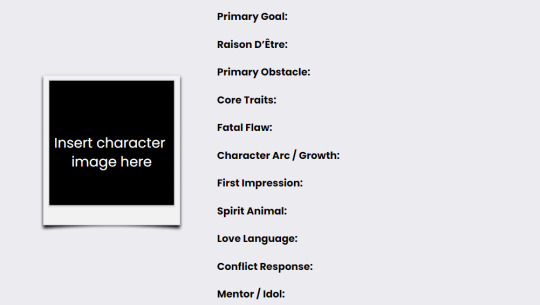
There's some fairly left-of-centre categories here, so in this blog post I'll be creating a character from scratch to demonstrate what each section means and how to use the template effectively.
Primary Goal & Raison D'Être
Fantasy Romance is having a bit of a tournament-to-the-death moment right now, with Hunger Games-inspired stories like Fourth Wing, Throne of Glass, The Savior's Champion, and The Serpent and the Wings of Night in high demand - so that's what we're going to work with in today's blog post.
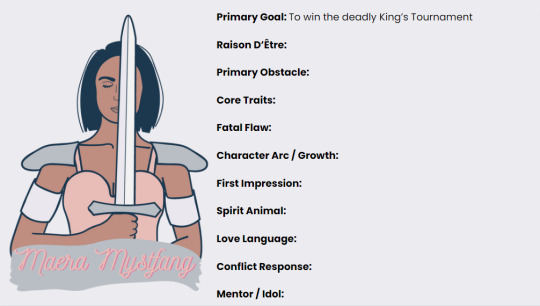
The story premise and primary goal of the protagonist are almost always interconnected. In this case, the story premise is a tournament to the death - and the character's main goal is to win that tournament, obviously.
But where there's room for some originality is in the raison d'être. This loosely translates to "reason for being" or "purpose". It's the why of it.
For example: what motivated this character to risk their life by entering such a tournament in the first place?
It is sometimes helpful to look at similar stories when thinking about this category. Not so you can copy their protagonist's motivations - but so you can do something different.
The whole selfless-self-sacrifice thing, for example - that's done. At least in relation to this particular sub-genre. We can do better for our hypothetical Maera Mystfang character.
Actually, let's really turn the trope on its head and make her raison d'être incredibly self-centred.

Already, this is character is shaping up to be something a little bit different within the niche of tournaments to the death. Which goes to show how putting a little bit of thought can go a long way, even with something as simple as identifying your character's initial purpose.
Primary Obstacle
Every protagonist needs a goal - and every goal needs an obstacle. This is what gives the story some tension and keeps readers turning the page.
An obvious choice of obstacle for this hypothetical character, since we're dealing with a fantasy romance, would be that Maera starts to develop feelings for one of her fellow competitors.
This concept has definitely been done, but that's okay. Not every section of this list has to break the mould. Tropes exist for a reason and it is totally okay to lean into them sometimes.
However, just for funsies, I'm going to try and put a slightly different spin on this one too.
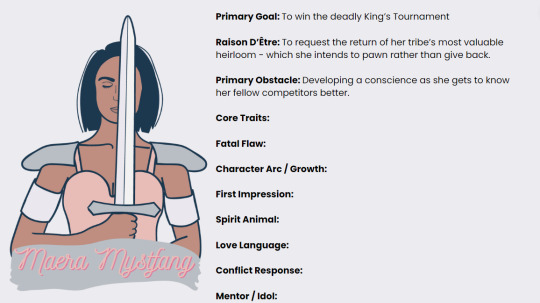
Instead of the obvious "I love one of the people I'm meant to kill", let's make Maera's (previously dormant) conscience be the problem. Her reasons for entering the tournament may have been self-motivated, but as she gets to know her fellow competitors - admires some of them, even - she starts to second guess those reasons.
Core Traits
A lot of character templates will divide personality traits into positives and negatives - but I don't think this is particularly helpful. It is far too one dimensional - not to mention unrealistic. The key components of someone's personality aren't usually so black and white.
In fact, most core traits are both good and bad at the same time - it just depends on the context.
Instead of being wholly positive or negative, try to think of three core character traits that can serve as two sides of the same coin, with both positive and negative implications to each.

For Maera, I've given her these core traits:
Self-reliant;
Rebellious; and
Good-humoured.
Her self-reliance means that she is incredibly capable - but it's also the cause of her selfishness. She's always had to look after herself, so she expects others to do the same.
Her rebellious attitude means she isn't willing to accept the status quo. But at times she is also a rebel without a cause, causing trouble just for the fun of it.
Her good sense of humour means she is fun to be around, but she also tends to not take things as seriously as she should.
Thinking of core traits in this multi-faceted way not only adds realistic complexity, but it also sets you up well for showcasing character development and growth throughout the story.
Fatal Flaw & Character Arc / Growth
You've probably read negative reviews that throw around terms like "Mary Sue" or "Gary Stu". People tend to be over-zealous with these terms, especially for Mary Sue, but the gist of it is that the character in question is "too perfect".
They're the chosen one, they're good at everything, all the boys like them, etc.
Some characters can get away with this just fine. Look at Aragorn. He's the ultimate Gary Stu but I still swoon every time he opens those damn doors. You know the scene I'm talking about.
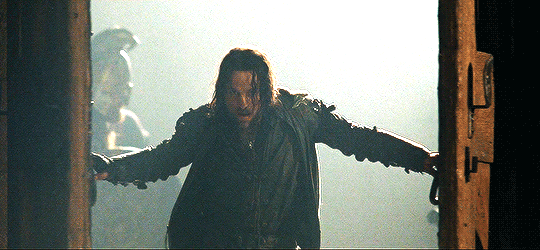
Ooft.
But for the most part, you want to incorporate a fatal flaw into your protagonists - because this is what gives them room to grow.
And, no. "I was born to be King but I don't wanna" does not count as a fatal flaw.
Instead, think bigger. Think worse. Think about where your character starts versus where you want them to end up. Think about how you want the events of the narrative to change their world view - or even their initial goal.
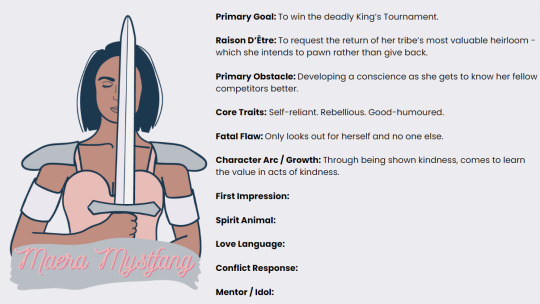
For Maera, her fatal flaw is pretty obvious, given her initial motivations for entering the tournament. Similarly, her growth/arc is linked to her primary obstacle, which is developing a conscious.
Her journey throughout this hypothetical story might be learning to appreciate how her past shaped her, while also acknowledging that there are things she can do to ensure others don't have to go through what she did. By being shown acts of kindness, she learns to appreciate their value.
First Impression
Now that we've covered all the "big picture" stuff, let's get into some of the smaller details that give your character some texture.
The first impression category is a hypothetical exercise where you image how your character might appear to a room full of strangers. In dual, multi, or omniscient POVs, you might even get the opportunity to include this impression somewhere in the story.
But even for first-person narratives, it is still worth thinking about, because it will help to inform how other characters interact and respond to your protagonist (at least at first).
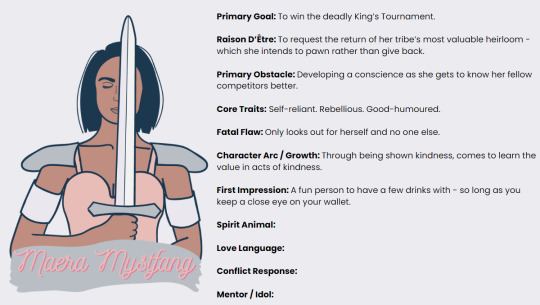
For Maera, I've written this first impression as: a fun person to have a few drinks with - so long as you keep a close eye on your wallet.
From this description, we can guess that Maera probably likes to have a good time, but also comes across as untrustworthy. Whether that impression is deserved or not is up to you, as the author, to decide.
There's also a lot of deeper directions you can take this first impression category, too. Like if most people react to Maera this way, but one particular character doesn't, then your readers are going to sit up and pay extra attention during that interaction. Especially when that person reacting atypically is the future love interest.
Spirit Animal
Ah, this one is a fun one!
I always encourage my authors to assign a "spirit animal" to their characters - especially when they're doing multi-POV.
There are two main reasons for this:
It will allow you to assign some very distinct adjectives and verbs with that particular character; and
It is an opportunity to flesh out some additional character traits beyond the core traits.
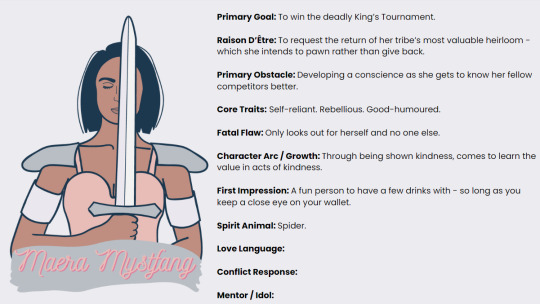
For Maera, I've chosen "spider" because she is solitary by nature, opportunistic, and patient.
But, more than that, I also like the idea of Maera being the kind of person who knows how to watch and wait. While her first impression might be "here for the good times", her joking façade is actually a mask she wears while carefully observing others.
For example:
Her words were laced with venom. She crawled her way across the rooftop. At some point, weaving lies had become more of a past time that a necessity. Her thoughts were a tangled mess. She didn't bother to conceal her predatory gaze. Inch by cautious inch, she crept forward. Her sanity was already hanging by a thread. If there was one thing she knew how to do, it was spin a good story - truth be damned.
I've never outright compared Maera to a spider in these examples, nor have I made it blatantly obvious that that's what I'm doing. But by peppering these kinds or words throughout the story, I'll be able to subtly create a very distinct kind of impression for her character.
For comparison's sake, let's assign "cat" to the love interest. Examples of possible words to consider in this instance might be:
He clawed his way through the bushes. "What are you doing?" he hissed. The comment had some bite to it, that was for sure. He slunk away into the darkness. His still, unwavering focus was unnerving. He prowled towards her. In a few quick, agile steps, he'd made it across the parapet. He yawned and stretched out beside her.
Of course, not every single word you use in association with a character needs to be related to their spirit animal. But keeping a certain type of animal in mind - and finding opportunities to throw in some subtle messaging through language choice - can be beneficial on so many levels.
It helps to distinguish your characters from one another through the kind of language you use to describe them - but it's also just really, really fun way to add some bonus texture to your characters. Giving your readers some little easter eggs like this is never a bad thing.
Love Language
If you're unfamiliar with the concept of the five basic love languages, then here's a quick visual overview:
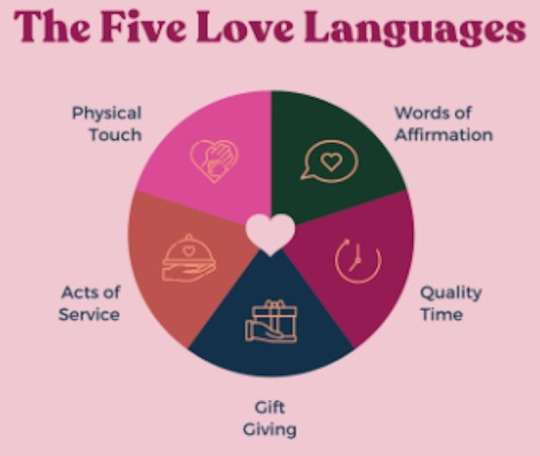
Love languages aren't a consideration that's specific to romance. They're important for friendships and familial relationships too.
Because thinking about what your protagonist values most in love is going to tell you a lot about who they are. Especially when you take the question deeper and think about why this is something they value.

For Maera, I've chosen "Acts of Service" because this ties in quite well to her character arc.
In terms of Maera's why, I could easily go with "because this was how she was shown love as a child" - and this is a good enough option most of the time. However, since her love language is very much tied into growing out of her fatal flaw, then I actually want to do the opposite.
Maera winds up valuing acts of service because this is something she craved - and wasn't given - as a child. She had to do things the hard way instead. Hence why she ends up appreciating the kindness of others so much. Such generosity is new to her - and precious.
Conflict Response
This is potentially one of the most overlooked character components. Conflict and tension is central to story telling, yet there is so little attention given to creating authentic, original responses to conflict.
The way I see it, there are three main considerations in regards to conflict response:
How your character reacts in the moment;
The unhealthy methods they use to deal with the aftermath; and
The healthy methods they use (or discover) to self-sooth.
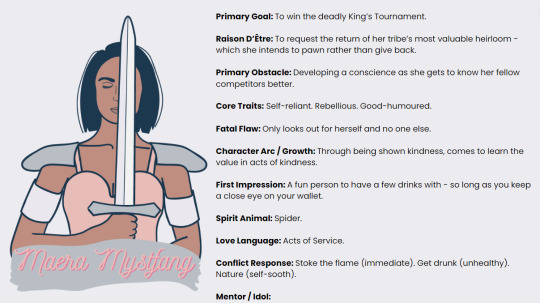
When faced with conflict, Maera's immediate reaction is to antagonise. She doesn't like to back down and enjoys creating trouble.
However, in the aftermath, the conflict affects her more than she lets on. She stews on it - and her solution to that is to get drunk until she can forget about it completely.
But even though she sometimes forgets it, Maera has a more healthy coping mechanism at her disposal. When she is surrounded by nature - in the forest, by the sea, whatever - it calms her.
In addition to identifying your protagonist's various responses to conflict, it is also helpful to think about why. Again, this is a great opportunity to insert something unique into their character backstory.
With Maera, for example, let's think about why she finds nature so soothing. Perhaps, amidst a very bleak childhood, one of her fondest memories is of picking grapes in a vineyard.
Perhaps the elderly woman who owned the vineyard was very rude and abrupt - but also quite kind to Maera in her own way. Maybe she would sometimes stitch up Maera's clothes or feed Maera a hearty, meaty dinner - even though she didn't have to.
If you're struggling to think of a real, tangible, unique memory such as this - then it's always helpful to go back to the old classic of write what you know. Think of a real life moment or memory - something that's stuck with you, no matter how simple - then adapt it to your character.
To create this vineyard example, I simply drew on my experience of picking strawberries with my Nonna after school.
Mentor / Idol
I could write an entire thesis on mentors. Or, more specifically, the "death of the mentor" trope - both in its literal and metaphorical interpretations.
But, for the sake of brevity, let's save that sh*t for another time and focus on what's important for a basic (yet complex) character template. And that is:
The Formative Mentor (past); and
Transformative Mentor (present).
The formative mentor (or idol) is someone who influenced your character prior to the events of the novel. Sometimes they're a character the reader will meet, or other times, they're long gone before the novel even begins.
The transformative mentor is a much looser term. It doesn't necessarily have to be a traditional mentor character, but rather it is a character who heavily influences or changes your protagonist throughout the events of the novel.

For Maera, I want her earliest idol to be a random female sell-sword who she crossed paths with. Prior to meeting this sell-sword, Maera was living without hope for a future, surviving on scraps and petty crime.
But after seeing an independent and moderately wealthy sell-sword in her local tavern, Maera got a glimpse into the kind of life that might be possible if she learned to fight. With the right kind of skills, she might be able to earn some decent money for a change - and travel the world.
This is an example of how "mentors" don't always have to be a wise wizard who oversees your protagonist's training and education. Young minds are impressionable - and even distant figures can have a lasting impact.
Just look at all the women who cite Legally Blonde as the reason why they were drawn to law. Elle Woods wasn't even real - but for plenty of young girls, she made an impact.
Similarly, your protagonist's "present" mentor or idol doesn't necessarily have to be a wise wizard either. It can simply be someone who motivates them to change their world view or strive to be better.
In romance, it is more than acceptable to have the present mentor coincide with the love interest - especially in standalone enemies-to-lovers. I know this seems counter-intuitive, since the word "mentor" implies a power imbalance, but it makes more sense if you readjust your definition of mentor to be "inspires change".
However, for Maera, I kind of like the idea of pairing her up with a love interest who shares some of her flaws. I vibe with the idea of making him a bit self-interested too, although for different reasons.
So in her example, I've listed the present mentor as a selfless secondary character. The way I would envision this going is Maera and the love interest team up early on - but somewhere along the way a secondary character saves them both. They're both heavily influenced by this character before this character sacrifices themselves. The aftermath of this incident rattles both Maera and her love interest, and serves as the spark for growth.

I hope you found this template - and very long explanation - useful!
#writing tips#character tips#book blog#writing#creative writing#character concept#originalcharacter#writeblr#writers on tumblr#writerscommunity#writer community#writer problems#writer things#original character#fantasy character#romance writing#writing advice#writer tips#writer tools#the smut analyst#raison d'etre#character traits#character tropes
212 notes
·
View notes
Text
PrepTober 2024 Exercise: Find Your Pace
I know a lot of people aren't participating in NaNoWriMo this year because of their stance on AI (and rightly so, I'm one of them). But I still enjoy the month long event of forcing myself to create something out of the idea that's been rattling ceaselessly in my brain. I'm not a masochist...
For this year's New Words November (better title pending), my focus is on building my ideal writing routine and schedule. I feel that if I know that side of myself better, I can create more realistic deadlines. If I have more realistic deadlines, then I can actually meet them. If I can meet my deadlines, well, the "if's" and "then's" go on and on from there.
Below is a two week exercise I made to find my ideal writing schedule based on my writing habits now. It's re-usable in the way that if life starts to get in the way, use it again to figure out a schedule that works for you. It's also good for people who want to take their writing a little more seriously.
I hope this works for you, and if it doesn't, feedback is always appreciated. Happy PrepTober everyone ✌︎︎♡⃛
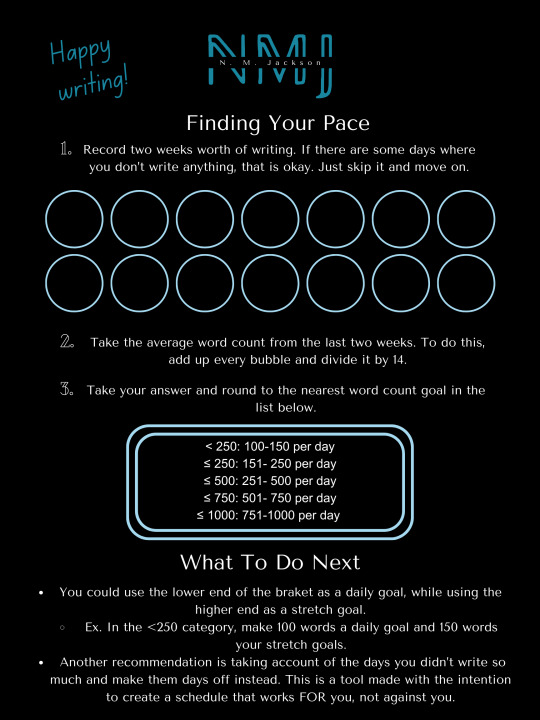
#preptober#2024#authorblr#writers of tumblr#author things#Find Your Pace#writing exercise#writer tools#nanowrimo#alternative#new words november#freebie#png download
5 notes
·
View notes
Text
New acquisitions. Time to get serious… a little bit. And mean.

Carla Hoch - Fight Write: How to write believable fight scenes
Michael J. Carlson - Hurting Your Characters: A writer’s guide to describing injuries and pain from the character’s point of view
Samantha Keel (@bysamanthakeel) - Ten B.S. Medical Tropes that Need to Die Today… and What to Do Instead: A scriptmedic guide
Sorry, Tyler…
Sorry not sorry, Xavier…
PS: Digging for references on Tumblr for Carla Hoch and Michael J. Carlson. As soon as I find one, I'll update the post.
14 notes
·
View notes
Note
could you share some tips on how you got into writing and anything you can share with us on how you got this big 👑
hi there 🫶🏻
this big? 🥹 I'm literally going to cry.
so I really got into writing when I was watching ,,Once upon a Time'' back then and I guess I got the idea from being unhappy with the plot and how the show ended
but on a more serious note, I discovered that fanfiction was a thing and then it kinda became my hobby. I write fanfiction because it gives me comfort hence why some of my topics are regarding mental health or just fluffy fics that are supposed to make the reader feel good.
the only real advice I can give is: write, write, write away. If you have a show, movie or a fandom that you are really passionate about then give it a go. In terms of the actual process of writing this is what I usually do/used to do:
I research a LOT. If I write for a fandom or a character that I don't know well, I do a lot of reading and watching. I study what the character wears, how they speak, what their little characteristics are and I make up my own headcanons beyond the show/movie in my mind or write them down.
I'm honest here. Sometimes ideas will just pop into your mind, sometimes I drive somewhere, overhear a conversation or a big one: song lyrics. I hear something and I get a certain idea and then when I have the time, I sit down and try to write.
I find it really helpful to create sentence starters or just story beginners and so there are different ways. Starting with describing the weather, the atmosphere or what a character is doing at that moment. I'm happy to share my starters and prompts with anyone if you would like.
and again don't be afraid to look for inspiration. there are some great prompt blogs out there like my favourite one: @littlewhispersofsolitude who post amazing ideas and you don't have to completely take their ideas but you can always scroll through their blogs to get some inspiration.
and lastly it's all about just typing away what comes to your mind. Your beginner things will be awful, unless you are secretly very incredibly talented and should consider switching careers. My beginners stuff on wattpad is bad and I considered deleting it but then I remembered that it's a reminder for how much my writing has improved over the years.
If anyone on here needs some more advice, would like some prompts, sentence starters or inspiration I am always happy to share, whether that is for the Sarah Paulson fandom or any other fandom or genre.
I hope this helped a little 🫶🏻
#asks#blogging#Sarah paulson#fandom#writing#fanfiction#on writing#creative writing#writerscommunity#writing community#writing tools#writer things#writing advice#writer community#writing techniques#writing prompt#writing stuff#writing tips and tricks#writer tools#writers of tumblr#writer blog#writers block#writers on tumblr#writer stuff#author help#author advice
19 notes
·
View notes
Text
Plot Generator
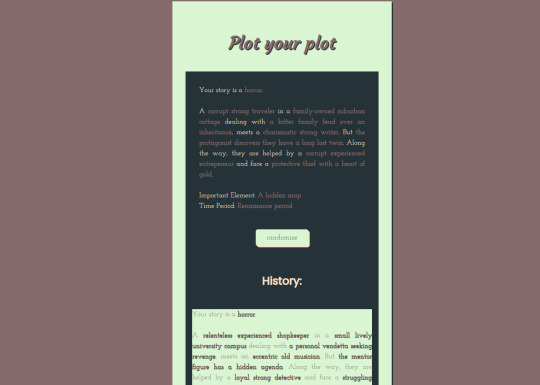
I created a plot generator thingy on Perchance!
Please let me know if you make something out of it ^^
8 notes
·
View notes
Text
Because I like writing and talking about writing, here's that sticky note story mapping thing again--progress has been made! Two stories--Sublimation and Rain's Redemption piece (proper title in progress).
Also, Duncan Idaho was incredibly helpful and only tried eating the sketchpad three times. You can see his little teeth marks at the bottom of the page with only one row of sticky notes and no color vomit.
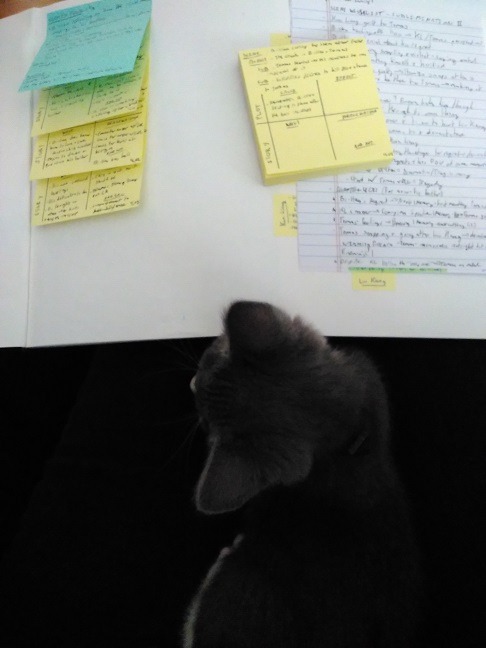

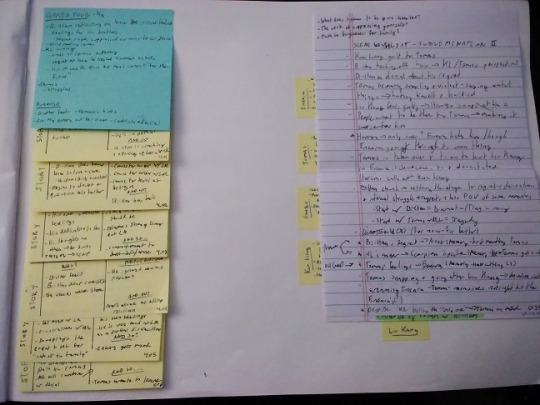
4 notes
·
View notes
Photo
Things I didn't know I need to know... But suddenly... I do need to know them.


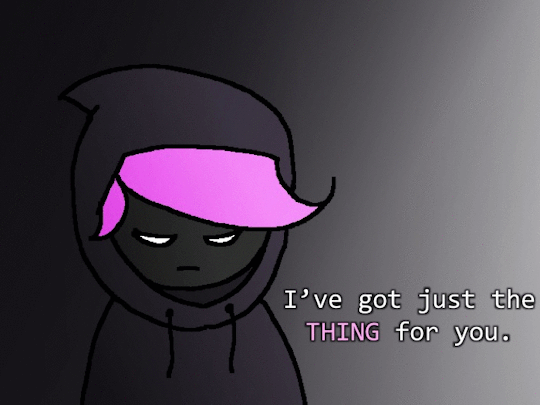
So, let me guess– you just started a new book, right? And you’re stumped. You have no idea how much an AK47 goes for nowadays. I get ya, cousin. Tough world we live in. A writer’s gotta know, but them NSA hounds are after ya 24/7. I know, cousin, I know. If there was only a way to find out all of this rather edgy information without getting yourself in trouble…
You’re in luck, cousin. I have just the thing for ya.
It’s called Havocscope. It’s got information and prices for all sorts of edgy information. Ever wondered how much cocaine costs by the gram, or how much a kidney sells for, or (worst of all) how much it costs to hire an assassin?
I got your back, cousin. Just head over to Havocscope.
((PS: In case you’re wondering, Havocscope is a database full of information regarding the criminal underworld. The information you will find there has been taken from newspapers and police reports. It’s perfectly legal, no need to worry about the NSA hounds, cousin ;p))
Want more writerly content? Follow maxkirin.tumblr.com!
451K notes
·
View notes
Text
100 Dialogue Tags You Can Use Instead of “Said”
For the writers struggling to rid themselves of the classic ‘said’. Some are repeated in different categories since they fit multiple ones (but those are counted once so it adds up to 100 new words).
1. Neutral Tags
Straightforward and unobtrusive dialogue tags:
Added, Replied, Stated, Remarked, Responded, Observed, Acknowledged, Commented, Noted, Voiced, Expressed, Shared, Answered, Mentioned, Declared.
2. Questioning Tags
Curious, interrogative dialogue tags:
Asked, Queried, Wondered, Probed, Inquired, Requested, Pondered, Demanded, Challenged, Interjected, Investigated, Countered, Snapped, Pleaded, Insisted.
3. Emotive Tags
Emotional dialogue tags:
Exclaimed, Shouted, Sobbed, Whispered, Cried, Hissed, Gasped, Laughed, Screamed, Stammered, Wailed, Murmured, Snarled, Choked, Barked.
4. Descriptive Tags
Insightful, tonal dialogue tags:
Muttered, Mumbled, Yelled, Uttered, Roared, Bellowed, Drawled, Spoke, Shrieked, Boomed, Snapped, Groaned, Rasped, Purred, Croaked.
5. Action-Oriented Tags
Movement-based dialogue tags:
Announced, Admitted, Interrupted, Joked, Suggested, Offered, Explained, Repeated, Advised, Warned, Agreed, Confirmed, Ordered, Reassured, Stated.
6. Conflict Tags
Argumentative, defiant dialogue tags:
Argued, Snapped, Retorted, Rebuked, Disputed, Objected, Contested, Barked, Protested, Countered, Growled, Scoffed, Sneered, Challenged, Huffed.
7. Agreement Tags
Understanding, compliant dialogue tags:
Agreed, Assented, Nodded, Confirmed, Replied, Conceded, Acknowledged, Accepted, Affirmed, Yielded, Supported, Echoed, Consented, Promised, Concurred.
8. Disagreement Tags
Resistant, defiant dialogue tags:
Denied, Disagreed, Refused, Argued, Contradicted, Insisted, Protested, Objected, Rejected, Declined, Countered, Challenged, Snubbed, Dismissed, Rebuked.
9. Confused Tags
Hesitant, uncertain dialogue tags:
Stammered, Hesitated, Fumbled, Babbled, Mumbled, Faltered, Stumbled, Wondered, Pondered, Stuttered, Blurted, Doubted, Confessed, Vacillated.
10. Surprise Tags
Shock-inducing dialogue tags:
Gasped, Stunned, Exclaimed, Blurted, Wondered, Staggered, Marvelled, Breathed, Recoiled, Jumped, Yelped, Shrieked, Stammered.
Note: everyone is entitled to their own opinion. No I am NOT telling people to abandon said and use these. Yes I understand that said is often good enough, but sometimes you WANT to draw attention to how the character is speaking. If you think adding an action/movement to your dialogue is 'good enough' hate to break it to you but that ruins immersion much more than a casual 'mumbled'. And for the last time: this is just a resource list, CALM DOWN. Hope that covers all the annoyingly redundant replies :)
Looking For More Writing Tips And Tricks?
Check out the rest of Quillology with Haya; a blog dedicated to writing and publishing tips for authors!
Instagram Tiktok
#hayatheauthor#haya's book blog#haya blogs#writing community#quillology with haya#writing tools#writer things#writing advice#writer community#writing techniques#writing prompt#writing stuff#creative writing#ya writing advice#writing tips and tricks#writer tools#writers of tumblr#writer blog#writers block#quillology with haya sameer#writers on tumblr#writerscommunity#writer stuff#author help#author advice#author#writing inspiration#writeblr#novel writing#on writing
32K notes
·
View notes
Text
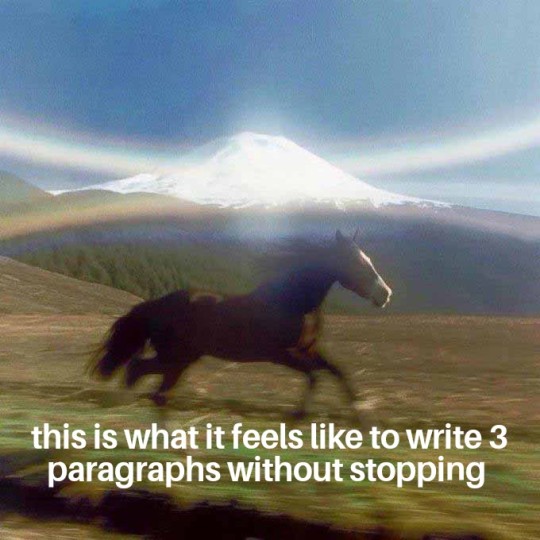
#writing#writers on tumblr#writing prompt#writers#writer#my writing#daily writing prompt#daily writing#story#writing tool#write it
139K notes
·
View notes
Text
Other Words for "Look" + With meanings | List for writers
Many people create lists of synonyms for the word 'said,' but what about the word 'look'? Here are some synonyms that I enjoy using in my writing, along with their meanings for your reference. While all these words relate to 'look,' they each carry distinct meanings and nuances, so I thought it would be helpful to provide meanings for each one.
Gaze - To look steadily and intently, especially in admiration or thought.
Glance - A brief or hurried look.
Peek - A quick and typically secretive look.
Peer - To look with difficulty or concentration.
Scan - To look over quickly but thoroughly.
Observe - To watch carefully and attentively.
Inspect - To look at closely in order to assess condition or quality.
Stare - To look fixedly or vacantly at someone or something.
Glimpse - To see or perceive briefly or partially.
Eye - To look or stare at intently.
Peruse - To read or examine something with great care.
Scrutinize - To examine or inspect closely and thoroughly.
Behold - To see or observe a thing or person, especially a remarkable one.
Witness - To see something happen, typically a significant event.
Spot - To see, notice, or recognize someone or something.
Contemplate - To look thoughtfully for a long time at.
Sight - To suddenly or unexpectedly see something or someone.
Ogle - To stare at in a lecherous manner.
Leer - To look or gaze in an unpleasant, malicious way.
Gawk - To stare openly and stupidly.
Gape - To stare with one's mouth open wide, in amazement.
Squint - To look with eyes partially closed.
Regard - To consider or think of in a specified way.
Admire - To regard with pleasure, wonder, and approval.
Skim - To look through quickly to gain superficial knowledge.
Reconnoiter - To make a military observation of a region.
Flick - To look or move the eyes quickly.
Rake - To look through something rapidly and unsystematically.
Glare - To look angrily or fiercely.
Peep - To look quickly and secretly through an opening.
Focus - To concentrate one's visual effort on.
Discover - To find or realize something not clear before.
Spot-check - To examine something briefly or at random.
Devour - To look over with eager enthusiasm.
Examine - To inspect in detail to determine condition.
Feast one's eyes - To look at something with great enjoyment.
Catch sight of - To suddenly or unexpectedly see.
Clap eyes on - To suddenly see someone or something.
Set eyes on - To look at, especially for the first time.
Take a dekko - Colloquial for taking a look.
Leer at - To look or gaze in a suggestive manner.
Rubberneck - To stare at something in a foolish way.
Make out - To manage to see or read with difficulty.
Lay eyes on - To see or look at.
Pore over - To look at or read something intently.
Ogle at - To look at in a lecherous or predatory way.
Pry - To look or inquire into something in a determined manner.
Dart - To look quickly or furtively.
Drink in - To look at with great enjoyment or fascination.
Bask in - To look at or enjoy something for a period of time.
#on writing#creative writing#writing#writing tips#writers block#how to write#thewriteadviceforwriters#writeblr#writers and poets#writers on tumblr#novel writing#fiction writing#romance writing#writing advice#writing blog#writing characters#writing community#writing help#writing ideas#writing inspiration#writing guide#writing prompts#writing a book#writing resources#writing reference#writing tips and tricks#writers#writing tools#writing life#writing software
19K notes
·
View notes
Photo

(via Writing (& Editing) Doesn't Have to Suck - by SJStone)
What I see so often from writers is what I call “the slog.”
The slog is real, and I totally understand when writers struggle, when you see writers talking about struggling to get 300 words on paper, when writers lament about the editing process, the marketing process, the querying process. This is the slog. The pure joy of writing, like any relationship, doesn’t persist 24/7/365. You have to do the work. You have to want it. You have to put in the time. You have to love it, even when you hate it. Like any good relationship, sometimes writing loves you, and sometime it hates you. And it’s okay.
The slog is real, and it’s coming for you. But it doesn’t have to be awful. I mean, it can be; it will be, but it doesn’t have to be. There are ways that you can sidestep the slog to some degree and make all that writing and editing and marketing fun. You just have to do different.
And so, here are some tips I have for you that I’ve found help me keep going through thick and thin, through dealing with the slog when every word carries a price and even when the words flow like wine and you’re drunk on the flow of your story.
#writing#writer#writers#writers on tumblr#author#fiction#writing advice#writer tools#using ai#text to voice#eleven labs#headliner#video content#editing#author shit#books#novels#short stories
0 notes
Text
How to Make Your Characters Almost Cry
Tears are powerful, but do you know what's more impactful? The struggle to hold them back. This post is for all your hard-hearted stoic characters who'd never shed a tear before another, and aims to help you make them breakdown realistically.
The Physical Signs of Holding Back Tears
Heavy Eyelids, Heavy Heart Your character's eyelids feel weighted, as if the tears themselves are dragging them down. Their vision blurs—not quite enough to spill over, but enough to remind them of the dam threatening to break.
The Involuntary Sniffle They sniffle, not because their nose is running, but because their body is desperately trying to regulate itself, to suppress the wave of emotion threatening to take over.
Burning Eyes Their eyes sting from the effort of restraint, from the battle between pride and vulnerability. If they try too hard to hold back, the whites of their eyes start turning red, a telltale sign of the tears they've refused to let go.
The Trembling Lips Like a child struggling not to cry, their lips quiver. The shame of it fuels their determination to stay composed, leading them to clench their fists, grip their sleeves, or dig their nails into the nearest surface—anything to regain control.
The Fear of Blinking Closing their eyes means surrender. The second their lashes meet, the memories, the pain, the heartbreak will surge forward, and the tears will follow. So they force themselves to keep staring—at the floor, at a blank wall, at anything that won’t remind them of why they’re breaking.
The Coping Mechanisms: Pretending It’s Fine
A Steady Gaze & A Deep Breath To mask the turmoil, they focus on a neutral object, inhale slowly, and steel themselves. If they can get through this one breath, they can get through the next.
Turning Away to Swipe at Their Eyes When they do need to wipe their eyes, they do it quickly, casually, as if brushing off a speck of dust rather than wiping away the proof of their emotions.
Masking the Pain with a Different Emotion Anger, sarcasm, even laughter—any strong emotion can serve as a shield. A snappy response, a bitter chuckle, a sharp inhale—each is a carefully chosen defence against vulnerability.
Why This Matters
Letting your character fight their tears instead of immediately breaking down makes the scene hit harder. It shows their internal struggle, their resistance, and their need to stay composed even when they’re crumbling.
This is written based off of personal experience as someone who goes through this cycle a lot (emotional vulnerability who?) and some inspo from other books/articles
#hayatheauthor#haya's book blog#haya blogs#writing community#quillology with haya#writing tools#writer things#writing advice#writer community#writing techniques#writing prompt#writing stuff#creative writing#ya writing advice#writing tips and tricks#writer tools#writers of tumblr#writer blog#writers block#quillology with haya sameer#writers on tumblr#writerscommunity#writer stuff#author help#author advice#author#writing inspiration#writeblr#novel writing#on writing
10K notes
·
View notes